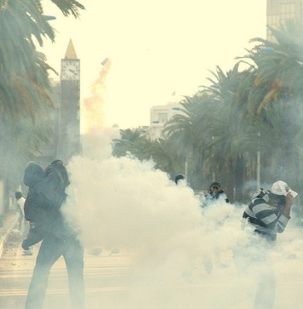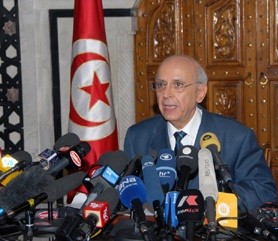|
Tunisia Politics | Human rights Tunisia freedoms still not secured
A representative from the US-based group Human Rights Watch (HRW) with her own eyes this weekend was able to observe how police in Tunisia still stick to repressive and violent methods.
While the majority of Tunisians are mostly happy to have achieved the ousting of ex-President Ben Ali and the following relative normalisation of the situation, large groups remain unhappy with age-old Prime Minister Mohamed Ghannouchi still heading government in Tunisia. Mr Ghannouchi's long loyalty to the ex-Dictator make him unfit to achieve the goals of the revolution, they hold. Apart from the freeing of political prisoners, a freer press and new faces in government, those continuing the protests see little change. The new Interior Minister, Farhat Rajhi, the hold, yet has to take initial steps to reform the police, including giving orders to halt police brutality and to respect freedom of assembly. The social mischief, which to a wide degree sparked the revolution, are not being properly addressed, the protesters hold. Some even see the situation as hopeless as it was before the revolution, as demonstrated by yet another Tunisian pouring petrol over himself in Tunis today. As Tunisian police concentrate on controlling further protests in the capital and other cities, there are meanwhile reports of ongoing looting in more remote areas, but also in the town of Hammamet, close to Tunis. The new government meanwhile tries to attract as little negative attention as possible, downplaying all incidents. Tunisia's newly appointed Central Bank governor Mustapha Kamel Nabli at Davos insisted the country already was safe for investors and tourists. Foreign governments, keen to see stability return to Tunisia under a secular government, meanwhile compete to establish favourable ties with the Ghannouchi government. The US already has eased its Tunisia travel alert, no longer generally advising its citizens against travelling to the country. By staff writer © afrol News - Create an e-mail alert for Tunisia news - Create an e-mail alert for Politics news - Create an e-mail alert for Human rights news
On the Afrol News front page now
|
front page
| news
| countries
| archive
| currencies
| news alerts login
| about afrol News
| contact
| advertise
| español
©
afrol News.
Reproducing or buying afrol News' articles.
You can contact us at mail@afrol.com









